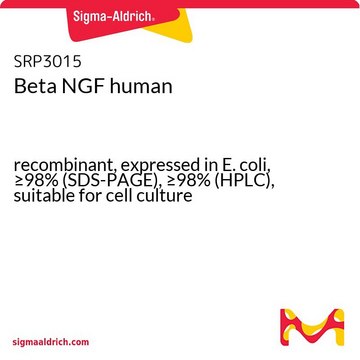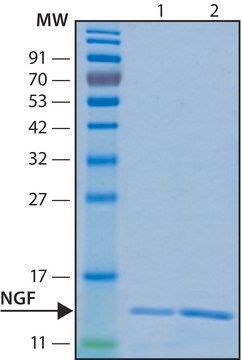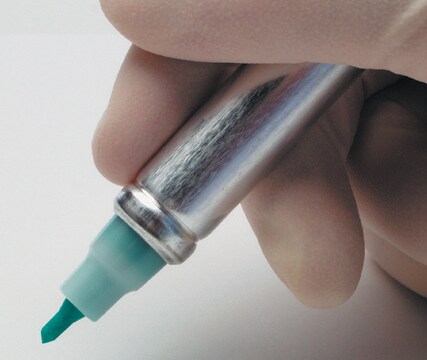NC010
Nerve Growth Factor 7.0s
Synonym(e):
holo-NGF
Anmeldenzur Ansicht organisationsspezifischer und vertraglich vereinbarter Preise
Alle Fotos(1)
About This Item
UNSPSC-Code:
12352207
eCl@ss:
32160405
NACRES:
NA.41
Empfohlene Produkte
Biologische Quelle
mouse
Assay
97% (SDS-PAGE)
Form
solid
Hersteller/Markenname
Chemicon®
Konzentration
1 mg/mL
UniProt-Hinterlegungsnummer
Versandbedingung
dry ice
Angaben zum Gen
mouse ... KLK4(56640)
Allgemeine Beschreibung
In the mouse submaxillary gland the neurotrophically active NGF, beta-NGF (2.5S), is part of a larger protein complex, 7S-NGF, which has the stoichiometry alpha2betagamma2 (+ 1 or 2 zinc ions) where the alpha and gamma subunits are members of the glandular kallikrein family of serine proteases, each of about 26 000 kDa molecular weight. The alpha and gamma subunits actually inhibit beta-NGF action and must be dissociated for biological activity to be observed.
This 7S complex has not been shown to occur in other mouse tissues, or in other species, probably because the alpha and gamma subunits, which are members of a larger glandular kallikrein family, apparently have a very restricted expression. The alpha and gamma subunits, members of the serine proteinase family, have quite similar amino acid sequences, although only the gamma subunit is catalytically active. The alpha subunit has undergone several mutations that preclude this function, including loss of the cleavage site needed for processing from the zymogen to the active form.
This 7S complex has not been shown to occur in other mouse tissues, or in other species, probably because the alpha and gamma subunits, which are members of a larger glandular kallikrein family, apparently have a very restricted expression. The alpha and gamma subunits, members of the serine proteinase family, have quite similar amino acid sequences, although only the gamma subunit is catalytically active. The alpha subunit has undergone several mutations that preclude this function, including loss of the cleavage site needed for processing from the zymogen to the active form.
MOLECULAR WT.:
130-140 kD. 7S NGF is composed of 3 subunits; 1 beta subunit (2.5S), 2 alpha subunits and 2 gamma subunits.
130-140 kD. 7S NGF is composed of 3 subunits; 1 beta subunit (2.5S), 2 alpha subunits and 2 gamma subunits.
Product Source: Mouse submaxillary gland (Darling & Shooter, 1984).
Anwendung
The recommended concentration to be used in vitro for maintenance of sympathetic and immature sensory nerve cells is 50-100 ng/mL medium (Varon et al., 1967).
Physikalische Form
Lyophilized. NC010 should be reconstituted with sterile DMEM at a concentration of
10 μg/mL and stored at -70°C. Medium with mNGF cannot be reused due to mNGF degradation.
10 μg/mL and stored at -70°C. Medium with mNGF cannot be reused due to mNGF degradation.
Lagerung und Haltbarkeit
Maintain at -20°C in undiluted aliquots for up to 6 months. Avoid repeated freeze/thaw cycles.
Hinweis zur Analyse
Specific Activity: The neurotrophic activity is in the range of 0.5-50 ng/mL using rat PC12 cells cultured for 7-14 days
Rechtliche Hinweise
CHEMICON is a registered trademark of Merck KGaA, Darmstadt, Germany
Haftungsausschluss
Unless otherwise stated in our catalog or other company documentation accompanying the product(s), our products are intended for research use only and are not to be used for any other purpose, which includes but is not limited to, unauthorized commercial uses, in vitro diagnostic uses, ex vivo or in vivo therapeutic uses or any type of consumption or application to humans or animals.
Lagerklassenschlüssel
11 - Combustible Solids
WGK
WGK 1
Flammpunkt (°F)
Not applicable
Flammpunkt (°C)
Not applicable
Analysenzertifikate (COA)
Suchen Sie nach Analysenzertifikate (COA), indem Sie die Lot-/Chargennummer des Produkts eingeben. Lot- und Chargennummern sind auf dem Produktetikett hinter den Wörtern ‘Lot’ oder ‘Batch’ (Lot oder Charge) zu finden.
Besitzen Sie dieses Produkt bereits?
In der Dokumentenbibliothek finden Sie die Dokumentation zu den Produkten, die Sie kürzlich erworben haben.
The isolation of the mouse nerve growth factor protein in a high molecular weight form.
S Varon et al.
Biochemistry, 6(7), 2202-2209 (1967-07-01)
Unser Team von Wissenschaftlern verfügt über Erfahrung in allen Forschungsbereichen einschließlich Life Science, Materialwissenschaften, chemischer Synthese, Chromatographie, Analytik und vielen mehr..
Setzen Sie sich mit dem technischen Dienst in Verbindung.








